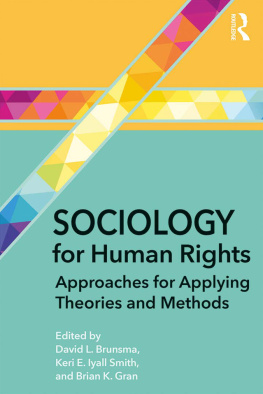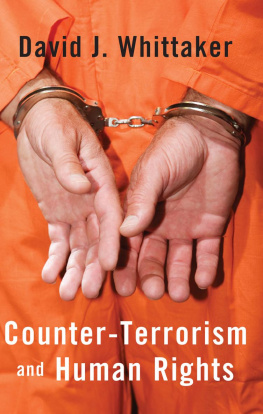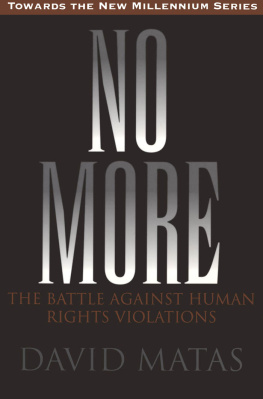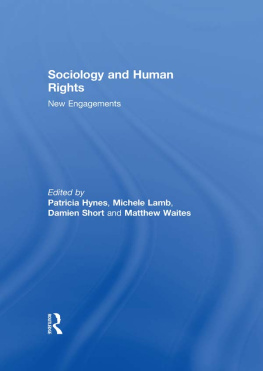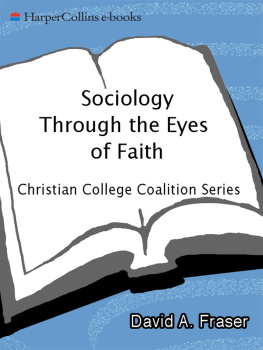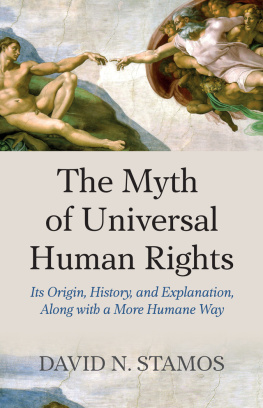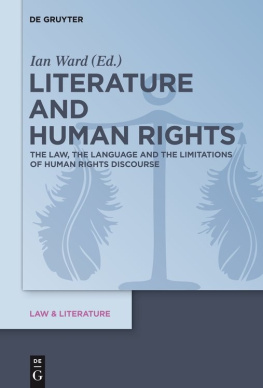SOCIOLOGY FOR HUMAN RIGHTS
A s sociologists deepen their examinations of human rights in their teaching, research, and thinking, it is essential that such work is conducted in a manner that is both mindful and critical of the knowledge we are building upon in sociology and human rights. As the authors of this volume reveal, creating sociological knowledge that examines human rights for the expansion of human rights is something that sociologists are well equipped to undertake, whether through the use of mathematics, comparative-historical analysis, the study of emotions, conversations, or social psychology. In these chapters you will find the roots of the study of human rights deep within sociological research and thinking as well as emerging techniques that will push the discipline as it seeks to expand our understanding of human rights together with so many other aspects of the social condition.
David L. Brunsma is Professor of Sociology at Virginia Tech in Blacksburg, Virginia, USA, and founding co-editor of Sociology of Race and Ethnicity .
Keri E. Iyall Smith is Associate Professor of Sociology at Suffolk University in Boston, Massachusetts, USA, and author of The State and Indigenous Movements .
Brian K. Gran is Professor of Sociology and Law at Case Western University in Cleveland, Ohio, USA. His publications have appeared in the Journal of Sociology and Social Welfare , Annual Review of Law and Social Science , and The International Journal of Childrens Rights . Gran also edits Societies Without Borders .
SOCIOLOGY FOR HUMAN RIGHTS
Approaches for Applying Theories and Methods
Edited by
David L. Brunsma
Keri E. Iyall Smith
Brian K. Gran
First published 2020
by Routledge
52 Vanderbilt Avenue, New York, NY 10017
and by Routledge
2 Park Square, Milton Park, Abingdon, Oxon, OX14 4RN
Routledge is an imprint of the Taylor & Francis Group, an informa business
2020 Taylor & Francis
The right of David L. Brunsma, Keri E. Iyall Smith, and Brian K. Gran to be identified as the authors of the editorial material, and of the authors for their individual chapters, has been asserted in accordance with sections 77 and 78 of the Copyright, Designs and Patents Act 1988.
All rights reserved. No part of this book may be reprinted or reproduced or utilised in any form or by any electronic, mechanical, or other means, now known or hereafter invented, including photocopying and recording, or in any information storage or retrieval system, without permission in writing from the publishers.
Trademark notice : Product or corporate names may be trademarks or registered trademarks, and are used only for identification and explanation without intent to infringe.
Library of Congress Cataloging-in-Publication Data
A catalog record for this title has been requested
ISBN: 978-0-367-25755-2 (hbk)
ISBN: 978-0-367-25756-9 (pbk)
ISBN: 978-0-429-28966-8 (ebk)
Typeset in Goudy
by Apex CoVantage, LLC
CHAPTER ONE
INTRODUCTION
CREATING KNOWLEDGE ABOUT HUMAN RIGHTS SOCIOLOGICALLY
David L. Brunsma , Keri E. Iyall Smith and Brian K. Gran
Sociologists have engaged with the notion of human rights from the earliest days of the discipline, particularly in the American context. Ideas of dignity and self-determination were especially present in the community-engaged sociologies of those who were marginalized in the discipline at the turn of the last century. Consider W.E.B. DuBois work in The Philadelphia Negro and Black Reconstruction as well as the work of Jane Addams whose scholar-activism in the discipline was unparalleled. Theirs was a model of sociological knowledge production that had at its core the ways that the sociological method can make better the lives of the individuals, families, and communities who were the subjects of their inquiries.
These founding mothers and fathers of American sociology, however, were significantly marginalized by their contemporaries (Morris, 2015). The communities where they studied and worked benefited from their tireless efforts and the scholarship they produced. Yet sociology itself, its theories and its methods, remained mired by a desire to copy the epistemological standards of the natural sciences, enlightenment ideals that split the mind and the body, as well as the positivist stranglehold of objectivity. Indeed, it was not until the 1960s, which brought epistemological, theoretical, and methodological challenges from sociologists (and their sociologies) that had been marginalized and made invisible to the heart of the discipline feminists, black sociologists, public scholar-activists, Chicano sociologists, indigenous sociologists, Marxist sociologists, and others that a space was opened for potential engagement with human rights. These challenges focused our sociological lenses in new (but very old, grounded) ways, and, indeed, again brought core notions of human rights into the sociological soup.
Knowledge production is what disciplines do. It also is a political endeavor full of contradictions, power plays, (in)validations, and complexities. Sometimes that knowledge is for knowledges sake alone. The work of knowledge production may boost the careers of researchers while objectifying those who share their lives in the form of data. Other times research is conducted for the good that it can do to better the human condition. Researchers and the communities they study may become collaborators, sharing the work of knowledge production at all stages, as they also share the benefits of scientific research. New ways of doing social science research and theorizing are emerging as we are all pushed to improve the work of research and grow our understanding of human societies.
Sociology is about the study of relationships that are unique to social groups (Peter Blau, 1999). In some ways, this is a modest endeavor for an academic discipline. Yet when one embarks on the work of examining relationships that are unique to social groups, complexities begin to emerge. As scholars of human rights, we have a deep knowledge of the human condition that we can utilize to help us think critically about how we practice the science of sociology. In this way, the ways that we seek to create knowledge must be flexible and dynamic, while not sacrificing the reliability of the empirical data. To produce knowledge within a particular discipline is to practice a science in particular ways ways that are fundamentally grounded in the way we think about ontology, epistemology, theory, methodology, and application. How a discipline thinks about these things is key to the kind of knowledge it can produce. Human rights bring new ways to think about ontology (notions of personhood, collectivity), epistemology (who can know, how we know, and what is known), theory (models of knowing), methodology (processes of data collection), and application (applying knowledge that is produced). This book collects some of these approaches.
Representing an exciting moment for sociology to further energize and develop a sociology of human rights (or, more to the point, sociologies of human rights), Sociology for Human Rights: Approaches for Applying Theories and Methods brings together leading and emergent scholars who seriously engage in revolutionary questions, resituate their substantive concerns within new terrains, and begin mapping the intellectual and practical contours of a human rights sociology. Each chapter responds to two primary questions: (1) How does a human rights perspective change the questions that sociologists ask, the theoretical perspectives that sociologists utilize, the methods that sociologists use, and the implications of sociological inquiry? And (2) How can the sociological enterprise (its epistemologies, theories, methodologies, results) inform and push forward human rights theory, discourse, and implementation toward a better world for all humanity?


